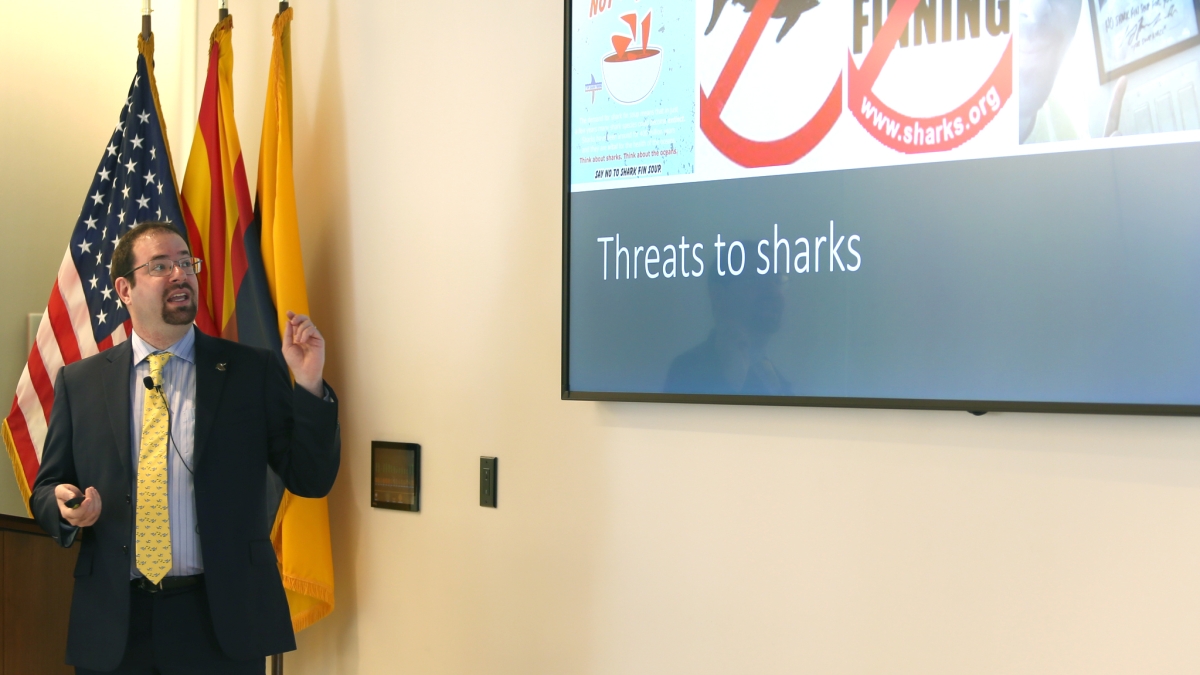A deep dive into shark conservation
Misinformation about sharks could lead to population declines, disrupting ecosystems

“Baby Shark,” the viral children’s song that became the postseason anthem of the Washington Nationals, may be unforgettable, but it’s also inaccurate. Despite what the catchy music video suggests, female sharks are often larger than male sharks, according to Arizona State University postdoctoral researcher and marine conservation biologist David Shiffman. And the cute animation is symptomatic of a broader cultural problem: People do not know very much about sharks.
On March 5, Shiffman spoke to a group of scientists, environmentalists and science communicators at ASU’s Barbara Barrett and Sandra Day O’Connor Washington Center about why sharks are in trouble and how misinformation, particularly online, impacts the species. According to the International Union for Conservation of Nature’s Red List of Threatened Species, 24% of sharks and their relatives are threatened by extinction. Shiffman cautions that humans are better off with healthy shark populations since declines disrupt ecosystems.
Though Shiffman’s research initially focused on policy solutions designed to protect sharks, he quickly found that there were broader problems that needed to be addressed first.
“When I start talking about what the experts think is the best thing to do, I encounter a lot of very passionate and enthusiastic nonexperts who not only don’t know that stuff, but actively don’t believe it,” Shiffman said. “So my research has shifted in recent years to, ‘Why do so many people believe wrong things about sharks and shark conservation, and how does that influence policy outcomes?’”
Shark conservation is surprisingly complex, and sharks face multiple threats to their survival, including threats from humans. Shiffman emphasized that, although unsustainable overfishing is one of the main threats that sharks face today, it is not the only threat conservationists and advocates must address.
A major obstacle to conservation efforts is the spread of misinformation, which makes it challenging to have rational, fact-based conversations about shark conservation, and to convince the public and policymakers that sharks should be protected.
For instance, there are activists who have been calling for a ban on shark fisheries because they don’t believe sustainable fishery exists. Shiffman argues there are plenty of fisheries in the U.S. and around the world that are sustainable.
“People who have no idea what they’re talking about are given huge platforms, and the rise of social media has been really bad for the spread of pseudoscientific nonsense,” Shiffman said. “One way we can protect sharks is by learning the real facts and not spreading misinformation.”
Shiffman’s lecture was sponsored by ASU’s Consortium for Science, Policy and Outcomes and was part of an ongoing series of policy seminar breakfasts.
Top photo by Hager Sharp
More Science and technology

Celebrating 34 years of space discovery with NASA
This year, NASA's Hubble Space Telescope (HST) is celebrating its 34th anniversary of the world's first space-based optical telescope, which paved the scientific pathway for NASA's James Webb Space…

Making magic happen: Engineering and designing theme parks
The themed entertainment industry is widespread and diverse, encompassing everything from theme parks to aquariums, zoos, water parks, museums and more. The Theme Park Engineering and Design…

AI-equipped feeders allow ASU Online students to study bird behavior remotely
ASU Online students are participating in a research opportunity that's for the birds — literally. Online Bird Buddies is a project that allows students to observe birds remotely, using bird feeders…